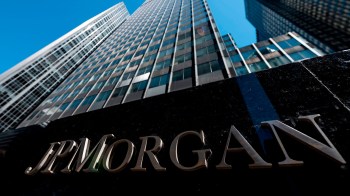
Whiteboard: Counterparty risk

Reading the headlines over the last two days, you could be forgiven for thinking it was 2008 again, and we were still mired in the financial crisis. “Was it all just a dream, Daddy?”
The thumping stock market drop on Thursday was the big news, but the real story is buried in the bond markets. Corporate bond traders were selling like mad during the latter half of the week, but — unlike their equity counterparts — they’re not buying again. They’re not convinced about the recovery, and they want to sit on the sidelines until they know it’s real.
One big reason: We’re still out of work. Next: We’re still not spending. But most urgently: They’re worried about Europe. And specifically, they’re worried about European banks.
Thing is, European banks are teetering on the edge of a credit crisis every bit as serious as the credit crunch that preceded the collapse of Bear Stearns and Lehman Brothers. If you don’t believe me, look at the headlines: “Libor Jumps most in 16 Months;”“Short Term Lending Rates Rise;”“Counterparty Risk Returns to Haunt Financials.”
Sounds familiar, right? Especially that last part, about counterparty risk. Banks in Europe are behaving exactly the same way today as banks in the U.S. behaved after Bear Stearns collapsed and was bought by JPMorgan back in 2008. They’re circling around each other, wondering if they can trust each other. Wondering if they can afford to business with each other. Here are some of the questions they’re asking:
How much Greek sovereign debt does this guy hold?
How much Greek corporate debt does he hold?
For that matter, how much PIIGS debt does he hold?
What about his other corporate debt, how exposed is it to Greece or any other of the PIIGS?
And what about the euro? Is it done for?
Now, before you go thinking this is a European problem, just remember what a bad day we had when the Dow plunged nearly 1,000 points. And Asia’s been having a tough time too. A lot of the contagion has to do with fear, but there are some fundamental concerns also, many of which have to do with our own banks. You see, it’s a global system, and we all buy each others’ debt.
That includes American and Asian banks: the Wall Street Journal has reported that Bank of America told the SEC it had $193 million in exposure to Greece’s sovereign debt, and $1.1 billion in non-sovereign debt to the country as of March 31. It said it has $205 million in credit default protection to Greece’s sovereign debt. Its total exposure to Greece, Ireland, Italy, Portugal, and Spain was $23.5 billion; it has a total $1.4 billion in credit protection against those countries.
In times like these it’s a good idea for banks to come clean about their holdings: it makes it easier for counterparties to trust that they’ll get their money back if they lend to them. One of Lehman’s problems was that no-one knew how much mortgage-backed debt they had on their books.
There is one problem, of course. Banks are notoriously slippery. The Lehman Repo 105 debacle shows just how slippery they can be. So if a Bank shows you its balance sheet and says “that’s all the Greek debt we have,” you’d be forgiven for wondering, “Hmmm. I wonder if that’s all there is.”
There’s a lot happening in the world. Through it all, Marketplace is here for you.
You rely on Marketplace to break down the world’s events and tell you how it affects you in a fact-based, approachable way. We rely on your financial support to keep making that possible.
Your donation today powers the independent journalism that you rely on. For just $5/month, you can help sustain Marketplace so we can keep reporting on the things that matter to you.


















